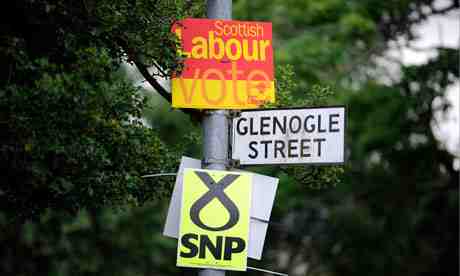
In days gone by there were some comforting certainties about Glasgow life. The Duke of Wellington statue always had a traffic cone on its head, Rangers Football Club was comfortably solvent, and Labour ran the magnificent 19th-century city chambers on George Square.
But now it seems only the first of those can be relied upon. In the former second city of empire an array of once mighty institutions are in varying degrees of crisis. And if Glasgow’s voters do decide to turf Labour out of office in the local elections on 3 May, that crisis could extend all the way to Ed Miliband’s office.
It seems ridiculous in some respects to contemplate anyone other than Labour being in charge of the city. A few years ago I was working for the leader of the Scottish National party when the Daily Record (another feature of Glasgow life that has not had its troubles to seek) launched a major campaign against drug dealers. The focal point of the exercise was a march from the city centre to Glasgow Green to which various politicians and others had been summoned, culminating in a rousing speech by the then chancellor, Gordon Brown.
At the start of the day the small SNP contingent was invited to a reception. Looking round the room we surmised that almost everyone else there had some sort of connection to the Labour party. Its domination of the city seemed set to continue for a long time to come. Indeed, at the following local elections the party secured 71 of the 79 seats on Glasgow City Council (albeit with less than 50% of the vote).
But such has been the pace of change in Scottish politics that at last year’s Holyrood elections the unthinkable happened. The SNP beat Labour in this, the heart of its heartland, taking seats that the nationalists would never have imagined were within its grasp just a few months earlier.
For the Conservatives (who actually formed a minority administration in the 1970s) and the Liberal Democrats, Glasgow is now a disaster area. In what is a warning for what could be going to happen in other British cities, Nick Clegg’s party has virtually disappeared, attracting just 2.5% of the regional list vote last May.
Equally, the run-up to this May’s election could hardly have been worse for the city’s ruling Labour group. The budget was passed by just two votes in February amid a wave of resignations and deselections.
Murky local politics has long been one of the Glasgow stereotypes, but then this has always been a place of contradictory characterisations. Marketers seeking to exploit the legacy of Charles Rennie Mackintosh have branded the city “Glasgow: Scotland with Style”. On the other hand, it can be used as a prime example of what Kenny MacAskill, the Scottish justice secretary, calls Scotland’s “booze and blades culture”.
Both views are to some extent borne out in reality. But what’s certainly true is that, contrary to the popular egalitarian myth, the city is ferociously unequal. It is sometimes claimed that in Glasgow’s West End there are more graduates per head of population than anywhere else in the UK, but at the same time school exam passes in the city are among the poorest in Scotland. Exam results are of course often no more than a measure of family income, and many middle-class parents move out of the city boundaries to what estate agents call “leafy” East Renfrewshire or Bearsden.
But there is also a new form of social exclusion opening up: in a world in which social networking, Googling and online shopping are apparently as natural as getting up in the morning, barely half the population of Glasgow has access to broadband, and a major cause is that a significant number do not even own a computer.
Despite the claims over schools, childcare and free Wi-Fi that are being made in the current campaign, it is difficult to see how local councillors, of any party, currently have the power to tackle these wider inequalities.
Instead, national politics is having a much greater impact on the lives of the city’s inhabitants. Seen in that light it seems appropriate that Glasgow’s local elections are likely to have major national consequences.
Losing control of Glasgow would provide yet more ammunition for those who doubt that Ed Miliband is a serious Downing Street contender. Combined with a loss in London’s mayoral race, it would almost certainly prompt deliberations over the future of his leadership.
For the SNP the stakes are high as well. Alex Salmond’s opponents are desperate for a slow-down in the nationalists’ momentum.
A good SNP result will mean not just the prospect of badly needed change in the way the city is governed. It will also be pored over by commentators eager to draw conclusions about the implications for the coming independence referendum.
For Scottish Nationalists (like me) the economic powers of independence are becoming ever more important. It might have been argued that until recently there was an informal contract in Britain whereby Glasgow, and Scotland as a whole, were denied the powers needed to exploit their inherent advantages and in return were compensated with public spending. But George Osborne is now withdrawing that “compensation”.
In truth the chancellor’s party gave up on the city a long time ago. But for Ed Miliband – who the SNP gleefully points out in one recent poll is even more unpopular in Scotland than in the UK as a whole – losing Glasgow would be a historic blow.
• Follow Comment is free on Twitter @commentisfree
guardian.co.uk © Guardian News & Media Limited 2010
Published via the Guardian News Feed plugin for WordPress.
